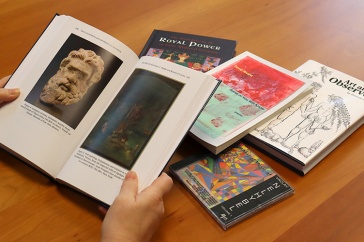
“I’ve always been attracted to hard-to-interpret texts,” says Jan Golinski, when asked at the Lindberg Lecture about his fascination with Humphry Davy’s posthumous publication, Consolations in Travel. For Golinski, Davy himself is a complicated text ripe for interpretation. That’s why he’s writing a book about him, a study of the way Davy created and re-created his identity over the course of his life.
Sir Humphry Davy (1778-1829) was a British chemist—the most famous of his day—known for discovering sodium, potassium, and other elements, and for inventions, including the Davy Lamp, used for mining safety. Golinski, a professor of history and humanities specializing in the science of history, has been researching this larger-than-life figure.“Davy was a glamorous individual who drew a lot of attention in his lifetime for his performances in public lectures and his writings. He was a chemist, a philosopher, a travel writer, a discoverer, and often thought of as an all-around ‘genius,’” says Golinski.
In the months before his death, suffering from two strokes, Davy worked on his final book, one strange for a man of science. His Consolations in Travel was more metaphysical and meandering than scientific, fashioned after Platonic dialogues and inspired by Enlightenment philosophy.
Jan Golinski is the 2012 winner of the Lindberg Award for outstanding teacher-scholar, the highest award given to faculty by the College of Liberal Arts. Professor Golinski earned his undergraduate degree at Cambridge University in England and his Ph.D. at the University of Leeds. He was appointed to the UNH faculty in 1990. Among Professor Golinski’s books are Science as Public Culture: Chemistry and Enlightenment in Britain, 1760-1820 (Cambridge UP, 1992; paperback, 1999); Making Natural Knowledge: Constructivism and the History of Science (Cambridge UP, 1998; 2nd ed., 2005); and British Weather and the Climate of Enlightenment (Chicago UP, 2007), which won the 2007 history book prize from Atmospheric Science Librarians International. He is considered a leading international scholar in the history of science. Professor Golinski has shown strong dedication to teaching at both the undergraduate and graduate level and consistently earns high praise from students, who note his broad command of knowledge. Students value his relaxed teaching style and great sense of humor, even as he is rigorous in his expectations. For his high qualities of scholarship and teaching, Professor Golinski has been honored with the Lindberg Award.
“Its central theme—the history of the earth and human progress—was conveyed through the fictional devices of dreams and visions,” says Golinski.
Not surprisingly, the book was received by the scientific community as an anomaly and a bit of an embarrassment, yet it sold well and enjoyed at least a dozen editions in London, with more produced in America, Germany, Holland, and elsewhere, according to Golinski.
In this year’s Lindberg Lecture, Golinski plumbs the contradictions of Consolations in Travel, exploring the features that made it unique, ambiguous, and hard for critics to grasp, including Davy’s use of multiple characters who each seem to represent the author, fracturing the point of view. Today, as in his own time, Davy’s views on religion, art, science, and history remain unclear in the text.
“One reason for the ambiguity,” posits Golinski, “is that it was consistent with Davy’s lifelong tendency to adopt masks of one kind or another, to experiment with his own identity. He was constantly assuming new personae, in his public performances as a scientific lecturer, in the course of his rapid rise up the social ladder, and in his writings.”
Ultimately, Davy’s willingness to alter his identity with the prevailing winds may have cost him his reputation. He was scorned by the scientists who came after him, considered a dilettante and too conservative, says Golinski. His successors sought recognition as respected professionals and disliked the public and aristocratic pandering they saw in Davy. While Golinski, in his own book, is not focused on repairing Davy’s reputation, he does wish to paint a fuller picture of the man, illuminating why Davy wore so many masks throughout his life. Those hoping to see that fuller picture must await the publication of Golinski's book.
The Lindberg Lecture is delivered annually by the previous year’s winner of the Lindberg Award for outstanding teacher-scholar in the College of Liberal Arts at the University of New Hampshire.
-
Written By:
Susan Dumais '88 '02G | College of Liberal Arts




















































